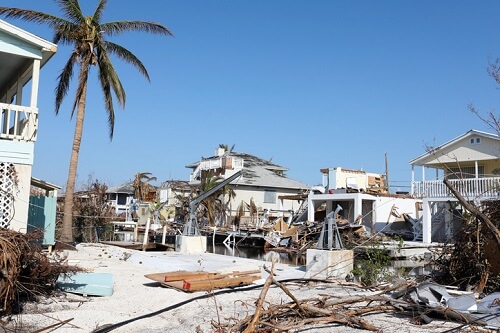

Hurricane preparedness remains a top-of-mind issue one year after one of the most damaging and deadly Atlantic hurricane seasons on record. Hurricanes Harvey, Irma and Maria dealt the US a triple sucker punch within the space of six weeks, causing hundreds of billions in damages and wreaking havoc for homeowners and business owners.
So far, 2018 has been relatively quiet on the Atlantic hurricane front but, as last year proved, all it takes is one major hurricane to make landfall for chaos to ensue. Andrew Higgins, senior regional technical & expertise manager at Allianz Global Corporate & Specialty (AGCS), noted: “The pain of last year is still fresh in everyone’s minds. I think the insurance industry, including the brokers, are being even more diligent this year in reminding homeowners and businesses to be prepared.”
The 2017 drama kicked off when Hurricane Harvey barrelled into states on the Gulf Coast, triggering widespread damage and flooding, including an estimated $125 billion losses in Texas alone. The city of Houston felt the brunt of the storm, with 36 lives lost and more than 150,000 homes flooded. Key takeaways from this event include understanding and acknowledgement of the city’s flood risk, and the importance of emergency planning, according to Higgins.
“Last year was a reminder that Houston is very vulnerable to flooding – and Harvey demonstrated that to the extreme,” Higgins told Insurance Business. “The city has grown so much in the last 20 years and there are no formal zoning laws, which means the ability to take water and move it where it needs to go is very limited. There’s also a lot of hardscape in Houston filled with concrete and asphalt, so the city is going to be vulnerable to flooding for many years to come.
“Even if they don’t get another Harvey, any kind of big rain event is going to result in flooding, so it’s important for the insurance industry to remind clients with a facility or an account in Houston (or anywhere near a flood zone) to be diligent and put together a flood emergency plan for that location.”
Shortly after Harvey, Hurricanes Maria and Irma dealt two of the deadliest blows on record to the island of Puerto Rico. CNN reported last week that Puerto Rican officials admitted the death toll from Hurricane Maria is 46 times higher than the 64 deaths they previously reported, at an estimated 2,975 fatalities. While mourning the storm’s many victims, the island has been frantically trying to repair and re-build vital infrastructure, but the destruction caused by the deadly storms was truly devastating.
“The hurricanes that impacted Puerto Rico were absolutely devastating to the island,” Higgins said. “They’re still in the recovery process and a lot of the infrastructure has been cobbled back together, which means that if another major hurricane were to hit Puerto Rico this year, the damage could be immense.
“They’re only now getting power back to remote areas in Puerto Rico. If a hurricane hits Puerto Rico this year, their infrastructure is very vulnerable right now, so we would expect power to be interrupted for a very long time. That’s why we have reminded our insureds on the island to have back-up power supplies, to be prepared and to test their emergency generators regularly.”
